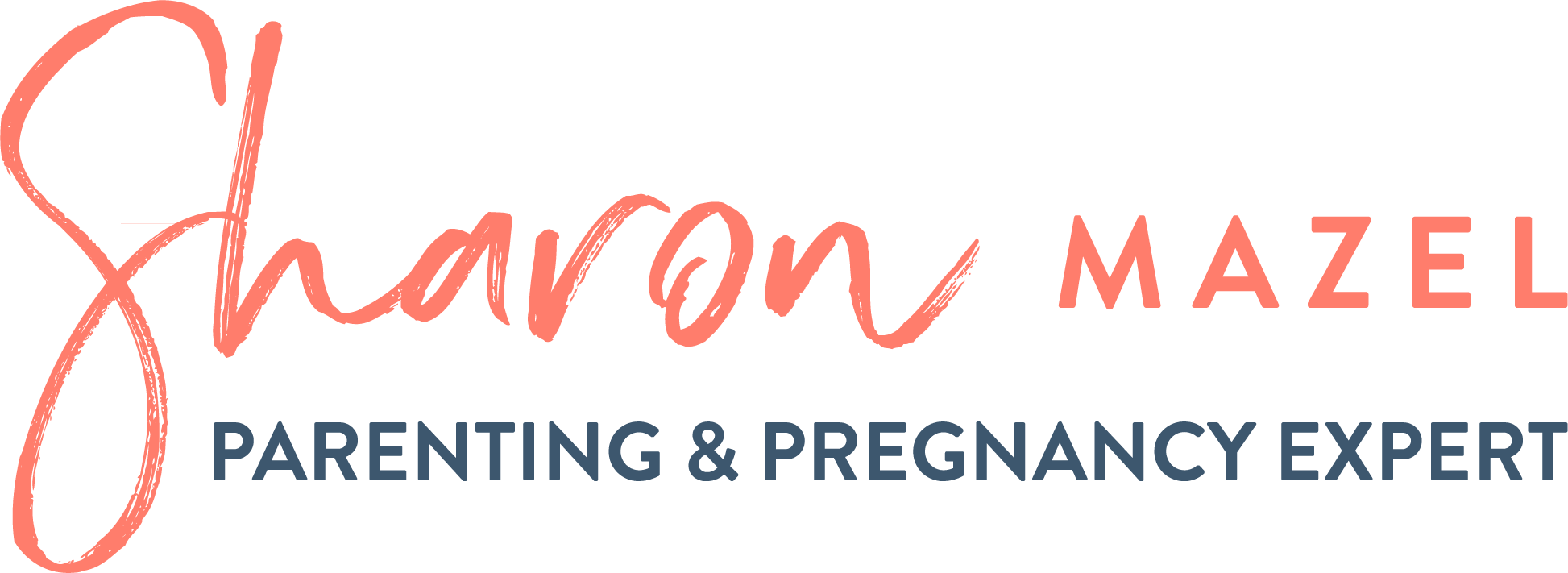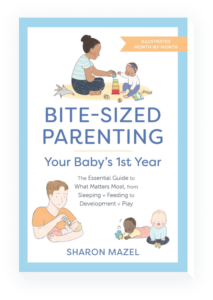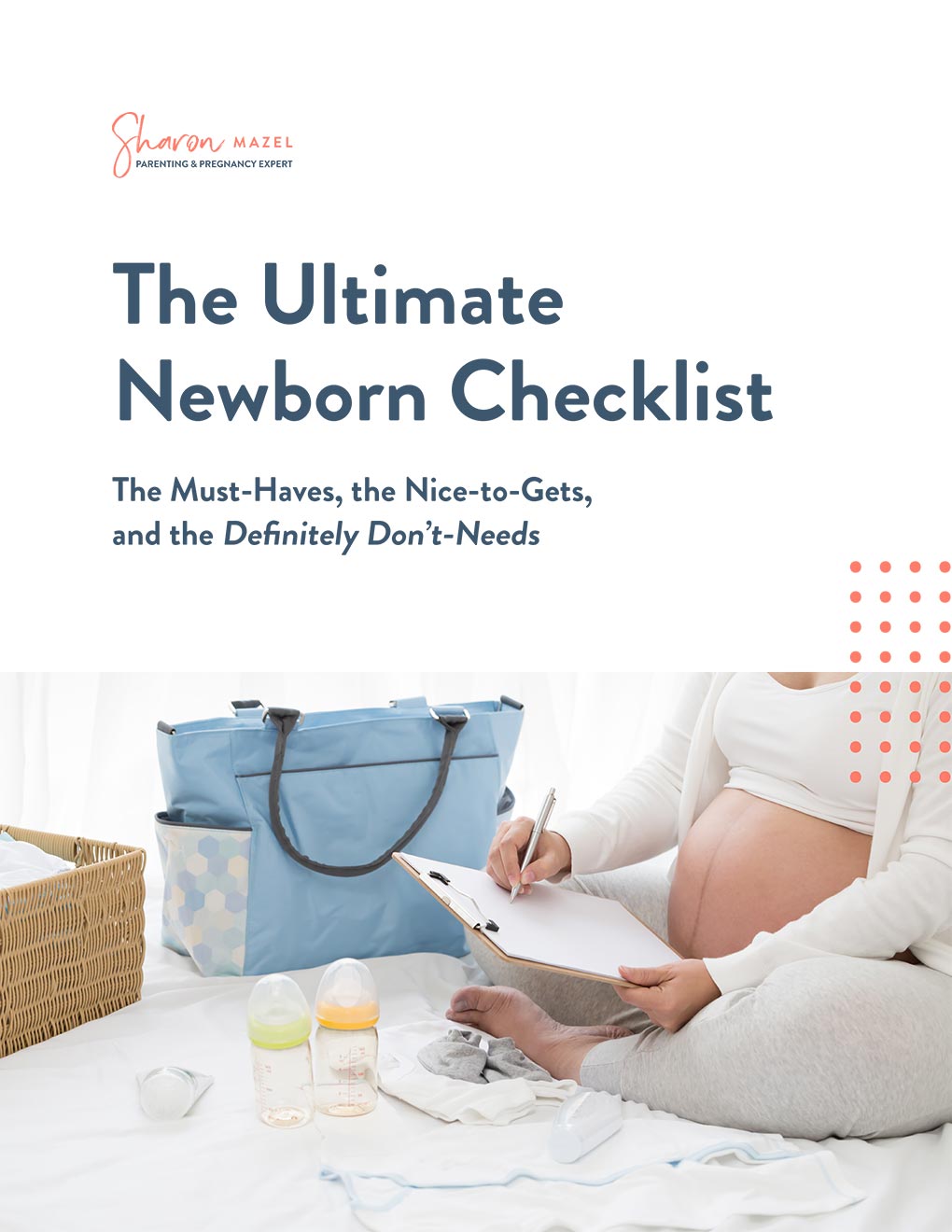Overwhelmed with your newborn? Of course you are! Just like every other new mom and dad out there is! But some of the worries that you might have don’t have to consume your mental energy, since they’re based in untruths instead of facts. Check out these 10 newborn myths that just aren’t true!
1. Myth: You’ll instantly fall in love with your newborn.
Truth: Most expectant parents imagine that the moment they’re handed their new baby they’ll feel immediate love and connection. And for some parents, that does happen. But for other new moms and dads, the reality goes more like this: The baby you’re handed will be a red-faced, crying, and squirmy, resembling no one you know (unless you’re counting old Uncle Bob), and you won’t feel much love or attachment at all. Not only is that normal, it’s also not something to worry about (you’re not a bad parent!). The love that you’re hoping for will come (I promise!), with time and through every interaction with your new baby.
2. Myth: The second night after birth is always the worst night.
Truth: Heard horror stories about the dreaded second-night curse? This is one of those newborn myths that makes its rounds among new parents. But don’t worry — there’s no guarantee that the second night will be worse than the first night or than the third night… or any night after that. So why do new parents often report that the second night after birth is terrible?
It’s likely because most newborns sleep deeply for the first 24 hours as they recover from the exhausting ordeal of being born. By the second night, however, they’re more rested and better able to react to their new surroundings. Life outside the cozy confines of the uterus includes bright lights, loud noises, unfamiliar touch, and cold air, so newborns react like, well… babies, crying and expressing discomfort, leading parents to think the second night is way worse than the first!
But the truth is, it doesn’t always end up that way. After all, every baby is different, and some babies have an easy time transitioning to life outside the womb, while other babies take a lot longer than 24 hours before they start showing signs of protest.
However your little baby reacts to this normal transition, take a breath and try to go with the flow. Offer as much comfort as you can — skin-to-skin contact, swaddling, soft soothing voices, breastmilk or formula — and your baby will acclimate before you know it.
3. Myth: Holding your newborn all the time will spoil her.
Truth: There’s no greater joy than cuddling with your new baby, so go ahead — hold your newborn as often and as long as you want to… and don’t feel guilty about it! Carrying a newborn around all day will not spoil her. Quite the opposite! It’ll teach your newborn that she is loved, she is secure, and she can count on you for comfort, food, soothing, and affection.
4. Myth: A newborn shouldn’t be bathed every day / A newborn should be bathed every day
Truth: Both of these statements are not true (which makes both statements newborn myths), as there is no absolute when it comes to bathing your newborn. You can bathe your baby every day if you’d like… or you can choose to bathe your baby every few days instead. It’s up to you, and you can decide based on your baby’s temperament. Maybe your baby will love and be soothed by the bath (cue the daily bath!). Or maybe your baby will scream bloody murder every time you undress him or place him in the water (bath? No thanks!).
And don’t forget about your needs, too! Some days you’ll just be too tired to give your baby a bath — and that’s perfectly okay! Remember, little babies don’t sweat or get dirty (other than in the diaper area, which you’ll be cleaning multiple times a day anyway), so there’s really no need to bathe your little one more than three times a week — unless you want to, that is. Your baby, your way!
5. Myth: Nipple confusion is a huge issue.
Truth: Check out social media and you’ll be sure to come across a scary tale or two (or ten) about nipple confusion. But the truth is a lot more nuanced than those newborn myths would have you believe.
The term nipple “preference” is probably more accurate than “confusion” — and it is true that some nursing babies prefer mom’s nipple to an artificial bottle nipple. But there are an equal (if not greater) number of babies who have no particular preference and who easily switch between bottle and breast nipple without a problem (and with little confusion). In other words, it’s not inevitable that your baby will have a nipple preference or have difficulty switching between breast and bottle.
The best way to prevent a nipple preference is to wait until nursing is well established (about 2 to 4 weeks) before introducing the bottle. On the flip side, be sure not to wait too long before introducing the bottle — do it no later than 4 weeks old — so that your baby doesn’t become set in his ways.
By the way, there’s another myth out there that offering a pacifier will cause nipple confusion. Here’s some good news: The research doesn’t bear this theory out, and the vast majority of babies have little difficulty going back and forth between the pacifier and mom’s nipples. So if you’re planning to offer a pacifier to your breastfed baby, don’t hesitate if it feels right for you — even from day one!
6. Myth: Adding baby cereal to the bottle will help your baby sleep through the night.
Truth: Here’s another one of those newborn myths that won’t go away. But studies show that adding cereal to the bottle won’t encourage your baby to sleep better or longer. What’s more, it’s never a good idea to add cereal to your baby’s bottle. Your baby’s digestive system isn’t ready for solids until close to 6 months old, and by then, any solids should be given by spoon or as finger foods, not in a bottle. Plus, putting cereal in your baby’s bottle could lead to overfeeding and too many calories. If that’s not reason enough, consider this: Thickening the milk in the bottle is risky and could lead to choking. Bottom line: Don’t do it —unless the pediatrician has specifically recommended it because your baby is suffering from reflux.
7. Myth: Your newborn needs to be bundled up during sleep to stay warm.
Truth: Less is more when it comes to dressing your baby for sleep. The general rule of thumb is to put your newborn in one additional layer than what you would wear at night. So your baby only needs to be in a onesie and a cotton PJ set or footed outfit, plus a sleeper or swaddle over it (which is equivalent to your blanket).
But many parents think a newborn needs to be bundled up to sleep, with a hat to ensure heat isn’t lost through the head (it’s one of the many newborn myths that is perpetuated by photos on social media!). That thinking is misguided. Being too bundled up can lead to your baby overheating, and overheating has been linked to a greater risk of Sudden Infant Death Syndrome (SIDS). Experts recommend against putting a hat on a baby when it’s time for sleep past the first day or two of life.
You’ll want to keep the room temperature somewhere between 68° and 72°F, if possible. If your house tends to run cool or warm, you can adjust your baby’s layers by adding an additional one or removing one. The best way to check your baby’s temperature is to feel the back of her neck or her chest.
8. Myth: Moms should eat bland foods when breastfeeding.
Truth: Did you know that what you eat affects the taste and smell of your breast milk? And that’s a good thing, since your breastfed baby will be exposed to different flavors through your breastmilk. That in turn, says research, will help your baby more readily accept new foods when he starts solids. So if you like your foods spicy, there’s no reason to change your diet when you’re breastfeeding.
Wondering about the newborn myths you’ve heard that breastfeeding moms shouldn’t eat gas-producing foods like cabbage, onions, broccoli, Brussels sprouts, or beans since it’ll make your baby gassier? Also not 100% true. Research shows that very few babies are actually sensitive to something in their mom’s diet. After all, most babies are gassy in general, and it has less to do with what their moms have eaten and more to do with their immature digestive tracts. If the gas was only due to what mom has eaten, formula-fed babies would never fart or spit up!
Occasionally, a breastfed baby does show sensitivity (or allergy) to something in a mom’s diet. You’ll know whether a food is offending your baby if you eliminate it from your diet for two to three weeks and your baby’s symptoms improve dramatically.
9. Myth: Crib bumpers help protect your baby’s head in the crib.
Truth: Crib bumpers may make a crib look pretty, and they seem like they’ll protect your baby from head bumps and arms or legs getting stuck in the crib slats, but bumpers are actually dangerous and pose a suffocation risk (just like comforters, pillows, or sleep positioners do). So don’t use bumpers in your baby’s crib and don’t worry if your baby bangs his head on the side of the crib (he won’t get hurt) or if his arms or legs get caught momentarily in the slats (even if you have to free those limbs!) — it won’t harm him. The same is true for the mesh crib liners. Experts recommend against using them since they may post entrapment and other risks.
10. Myth: Sleeping newborns need complete silence.
Truth: Most newborns can sleep with lots of sound around them — after all, they heard plenty of noises when they were in the womb. Even beyond the newborn stage, plenty of babies do fine sleeping through background noise — especially if it’s something they’re used to (say, noise from outside traffic or just general household sounds). There are some babies who are more sound-sensitive, and so like everything else when it comes to your baby, take your cues from her when figuring out how much you have to protect your baby from noise.
How many of these newborn myths and truths surprised you? You’ll get answers to all your questions about newborn sleep, feeding, development, crying, care, health, milestones, and more, in my course Newborns 101: Preparing and Caring for Your Newborn with Confidence. You’ll become a more knowledgable and empowered new parent!
Looking for more information about newborns and beyond? My book Bite-Sized Parenting: Your Baby’s First Year covers it all and includes these topics and more! It’s THE parenting book you’ll turn to again and again, so be sure to add it to your parenting library.


